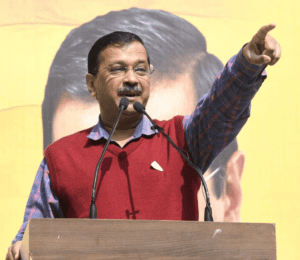
In a significant development, the Supreme Court has granted interim bail to Delhi Chief Minister Arvind Kejriwal until June 1, paving the way for his imminent release nearly two months after his arrest by the Enforcement Directorate in connection with a money-laundering case linked to a contentious liquor policy. This ruling allows the Aam Aadmi Party (AAP) leader to potentially engage in campaign activities during the ongoing Lok Sabha elections, albeit with the condition of surrendering on June 2, two days before the declaration of election results. Notably, during this interim period, Kejriwal will abstain from performing his duties as the chief minister.
Kejriwal’s possible release from jail, anticipated as early as Friday night pending the receipt of the bail order by Tihar, where he is currently detained, promises a significant morale boost for his party. Political allies of the AAP, including the Congress, the Shiv Sena (UBT), and the Trinamool Congress, have enthusiastically welcomed the court’s decision. Notably, Kejriwal’s legal counsel emphasized that the court has placed no restrictions on his campaigning activities.
However, in compliance with the court’s directives, Kejriwal will refrain from visiting the Office of the Chief Minister and the Delhi Secretariat. He will also abstain from signing official files unless necessary to obtain clearance or approval from the Lieutenant Governor of Delhi. Furthermore, Kejriwal must furnish a Rs 50,000 bail bond and refrain from making any comments pertaining to his involvement in the ongoing case, interacting with witnesses, or accessing official files connected to it.
During the court proceedings, Solicitor General Tushar Mehta contended that there was no precedent for releasing an individual for campaigning purposes. However, the bench, comprising Justice Sanjiv Khanna and Dipankar Datta, reasoned that the 21-day bail period would not significantly impact the case. The court also cautioned against drawing parallels with unrelated cases.
The apex court highlighted the timeline of the liquor policy case, which was registered in August 2022 and culminated in Kejriwal’s arrest in March 2024. The court also underscored the delay in the legal proceedings. Senior advocate Abhishek Singhvi, representing Kejriwal, had sought relief until June 5, a day after the election results were announced, but the court declined this request.
Notably, Solicitor General Mehta invoked the case of Khalistani separatist Amritpal Singh, who sought relief to file his nomination for elections, to which Justice Khanna responded, indicating the distinction between the two cases.
Kejriwal’s arrest on March 21 stemmed from allegations related to the purported Delhi liquor policy scam. He joins his former deputy, Manish Sisodia, and party colleague, Sanjay Singh, who is embroiled in the same case and currently out on bail. The Enforcement Directorate, which probes financial crimes, contends that the now-defunct Delhi liquor policy orchestrated by the AAP government involved corrupt practices and kickbacks.
While the AAP alleges targeting by the ruling Bharatiya Janata Party (BJP) at the Center to stifle opposition voices through probe agencies, federal ministers refute such claims, asserting the independence of probe agencies.

